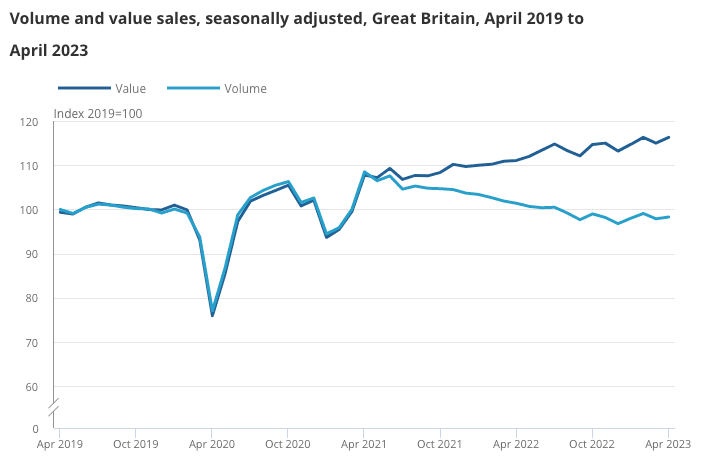Retail Sales Improve
- Written by: Gary Howes

Image © Adobe Stock
UK retail sales surprised to the upside thanks to improved weather in April, said the ONS.
Retail volumes rose 0.5% month-on-month in April, ahead of expectations for a reading of 0.4% and marking a notable improvement in the -1.2% recorded in March.
The gain was led by the non-food sector, which rose by 1.0% over the month, up on the -1.8% for March, with retailers saying improved weather conditions were behind the uplift.
March 2023 was the sixth wettest March on record, with the UK receiving 155% of its expected average monthly rainfall.
Retail sales volumes were 3.0% lower in the year to April, which was up on March's -3.9% but weaker than the market's expected -2.8%.
Advertisement
Check here for the best Norwegian online casinos.
Food store sales volumes rose by 0.7% in April 2023, following a fall of 0.8% in March 2023, but despite this increase, food store sales volumes were 2.7% below their pre-coronavirus February 2020 levels.
"The pickup in retail sales in April will be welcomed by UK retailers. Increasing wages are offsetting some of the cost-of-living squeeze, which is helping to make consumers feel better off. However, any increase in unemployment later in the year could dampen confidence once more," says Emma Mogford, fund manager, Premier Miton Monthly Income Fund.
The data meanwhile confirmed the ongoing impact inflation was having on the sector with consumers spending more on retail sales but getting less for their money:
The data shows the divergence started almost exactly two years ago when the impact of Covid lockdowns started to impact supply chains.
The issue only became more acute when Russia's invasion of Ukraine a year later sent energy prices spiralling.
"No one is going to look at these figures and claim consumers are feeling flush. But at the same time the cataclysmic predictions for the UK economy in 2023 are proving very wide of the mark," says Charlie Huggins, Manager of the Quality Shares Portfolio at Wealth Club.
The CBI's distributive trends survey of the retail sector meanwhile shows these price pressures continue to persist, as per the latest findings, suggesting the yawning gap between volumes and value won't close anytime soon.
"The worry is that higher interest rates have yet to really bite. Many people are still sitting pretty on fixed rate mortgages. When they refinance they are going to find their disposable incomes drop significantly. At that point retailers may really start to feel the pinch, especially if inflationary pressures remain elevated," says Huggins.




